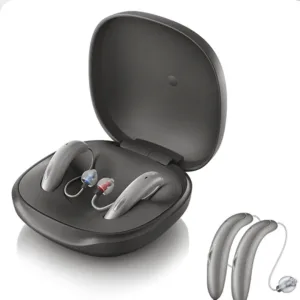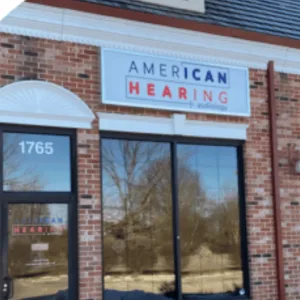Less Expensive Hearing Aids: Quality Sound Without the High Price
Diving into the world of less expensive hearing aids opens up possibilities. Quality sound doesn’t always come with a hefty price tag. Here’s a quick overview of what the spectrum looks like:
- Low-End Models: These models are perfect for those with mild hearing loss or first-time users. They focus on basic functionality, and while they might not offer many customization features, they provide a solid foundation for better hearing.
- Mid-Range Options: These strike a perfect balance for individuals with moderate hearing loss. They bring together a mix of essential features and performance, all at a reasonable cost. It’s a go-to choice for those who want more without spending a fortune.
- High-End Solutions: These are designed for severe hearing loss and packed with cutting-edge technology. They’re top-tier, with features like directional microphones, tinnitus relief, and smartphone integration. They’re for users who value the best features available.
No matter where you fall on the spectrum, understanding how long hearing aids last is vital. Investing in less expensive hearing aids doesn’t mean compromising on quality or longevity. With proper care, your hearing aids can be a long-term solution to hearing loss.
Understanding Hearing Aid Pricing
The cost of hearing aids isn’t arbitrary; specific elements significantly influence their price points. Understanding these can shed light on why some options are pricier than others.
Technology and Customization Drive Costs Up
- Advanced Features: Innovations like wireless connectivity, noise cancellation, and environment adaptation enhance user experience but also add to the price.
- Customization Capabilities: Hearing aids programmed and adjusted for individual hearing profiles offer better performance but require additional technology and expertise.
Design Affects Price
- BTE Models: Common and less costly, fitting more tech due to size.
- ITE Models: Smaller, discreet, and usually pricier for their compact design.
- CIC and IIC: Tiny, custom-fit aids are the most discreet but carry the highest prices.
- Material and Build: Durable, lightweight materials that provide comfort and longevity are more expensive to produce.
Research and Development
- Innovation Costs: The research and development required to introduce new features and ensure reliability contribute to higher prices for cutting-edge models.
- Regulatory Compliance: Meeting strict regulatory standards for medical devices increases manufacturing costs.
- These components combined explain the higher prices of certain hearing aids.
Investing in these devices means paying for more than just the hardware; it’s about acquiring a comprehensive hearing solution that includes advanced technology, professional services, and ongoing support to ensure optimal hearing health.
How Long Do Hearing Aids Last? Upfront Costs Vs. Long-Term Benefits
Opting for prescription hearing aids initially can lead to lasting satisfaction and savings. Here’s a closer look at how investing upfront in quality can benefit you over time.
Choose Quality for Longevity
- Built to Last: Higher-end hearing aids use superior materials, offering more durability and a longer life.
- Feature-Rich: Models with advanced features enhance your hearing experience, requiring less frequent upgrades.
- Clearer Conversations: Features like directional microphones isolate speech, making it easier to hear in noise.
- Ease of Use: Automatic settings adjust to your environment, simplifying your experience and enhancing satisfaction.
Professional Hearing Care Provides Benefits
- Customized Fit: Hearing care specialists tailor hearing aids to your hearing loss, ensuring optimal sound quality.
- Ongoing Support: Regular professional maintenance extends your hearing aid’s functionality and life.
- Enhanced Well-being: Better hearing contributes to social interactions and overall quality of life, offering immeasurable value.
Discover more about hearing aid repairs.
Making a Smart Choice
- Open Discussion: Share your needs and budget with your audiologist for tailored advice.
- Assess Value: Look beyond initial costs to the benefits and potential savings of quality aids.
- Explore Financial Options: Ask about warranties and payment plans to ease the upfront investment.
Investing in your hearing health is crucial. By considering the long-term benefits and value, you can find hearing aids that not only fit your budget but also enhance your life for years to come. Quality aids, fitted by a professional, might cost more initially but can be more economical and satisfying in the long run.

Finding Less Expensive Hearing Aids
Discovering less expensive hearing aids without compromising quality involves a few strategic steps. Here’s how to save without sacrificing your hearing solution’s effectiveness.
Leverage Your Hearing Insurance
- Understand Your Benefits: Contact your insurance for details on hearing aid coverage. Check the deductible, copay, and coverage limits. You can also call your closest American Hearing + Audiology center; we have insurance specialists on staff who can help you.
- Choose In-Network Hearing Providers: Opt for providers within your insurance network for lower out-of-pocket costs, thanks to pre-negotiated rates.
- Explore Hearing Aid Specific Benefits: Some policies include benefits tailored to hearing aids, like partial cost coverage or purchase allowances.
Affordable Options Are Available
- Select Mid-Range Devices: A mid-range hearing aid can offer a suitable balance of features and cost, which is ideal for many users.
- Inquire About Discounts: Ask audiologists about available discounts, including those for seniors, package deals, or cash payments.
- Manufacturer Offers: Check for rebates or assistance programs from hearing aid manufacturers designed to make their products more accessible.
How a Licensed Hearing Care Provider Can Assist
- Personalized Needs Assessment: They’ll evaluate your hearing challenges, lifestyle requirements, and financial constraints.
- A Range of Options: You’ll discuss various hearing aids, from high-end to more budget-conscious models, to find your best match.
- Guidance on Cost-Effectiveness: They help you navigate towards hearing aids that provide great value, considering technology, durability, and after-care costs.
- Emphasis on Long-Term Advantages: They’ll explain the benefits of certain features for a better hearing experience over time, possibly suggesting a bit higher initial spend for more excellent long-term value.
Learn more about how to find the best audiologist near me.
Striking the Right Balance
Securing a less expensive hearing aid solution is about more than just the initial cost. It involves making informed decisions with the help of a caring professional, understanding insurance benefits, and choosing a device that meets your needs without overspending. By focusing on both price and quality, guided by an expert audiologist, you can enhance your hearing health in a cost-effective manner, ensuring long-term satisfaction and well-being.

Quality Sound on a Budget: How to Choose
It is essential to discover how to secure quality sound with less expensive hearing aids. Here’s a guide on what to prioritize.
Essential Features in Less Expensive Hearing Aids
- Noise Reduction: Vital for clearer listening in noisy surroundings. Many affordable aids include this feature, enhancing speech understanding.
- Directionality: Focuses on sounds ahead, crucial for conversations in crowded places. Available in many mid-range options, it boosts conversational clarity.
- Programmability: Allows for adjustments across different environments, offering a tailored listening experience even in simpler models.
- Connectivity: Some budget models provide connectivity options for direct audio streaming, albeit more basic than premium versions.
Maximizing Audio Quality with Affordable Aids
- Set Realistic Expectations. Understand that while budget aids may not perform as well as top-tier models, they can substantially improve hearing.
- Utilize Trial Offers: Testing hearing aids during a trial period can help you assess their sound quality and suitability for your needs.
- Prioritize Speech Clarity: Look for aids emphasizing features that enhance speech understanding, such as noise reduction and directional mics.
- Keep Up with Adjustments: Hearing changes over time, and regular visits to the hearing care provider for hearing aid adjustments ensure ongoing optimal performance.
Further Tips for Choosing Wisely
- Consider Latest Technologies: Often, newer mid-range models outperform older high-end ones due to technological advancements.
- Assess Your Hearing Needs: For mild to moderate hearing loss, a well-chosen mid-range hearing aid may deliver quality sound.
In summary, selecting less expensive hearing aids doesn’t mean compromising on quality. With careful consideration of critical features, a focus on models that enhance speech clarity, and the guidance of a professional audiologist, you can find a cost-effective solution that meets your hearing needs. Remember, the right fit and ongoing care are paramount in ensuring your hearing aids provide the best possible sound, regardless of price.

Balancing Cost and Quality for Better Hearing
So, finding less expensive hearing aids that offer quality sound is entirely possible. With the right features, such as noise reduction and directional microphones, and the guidance of a skilled hearing care provider, you can enjoy clear, effective hearing support without breaking the bank. Remember, the longevity of your hearing aids doesn’t solely depend on their price tag but also on how well they fit your needs and how they’re maintained.
Don’t let the cost deter you from improving your hearing health. Contact American Hearing + Audiology today to explore affordable hearing aid options and take the first step towards clearer hearing.






